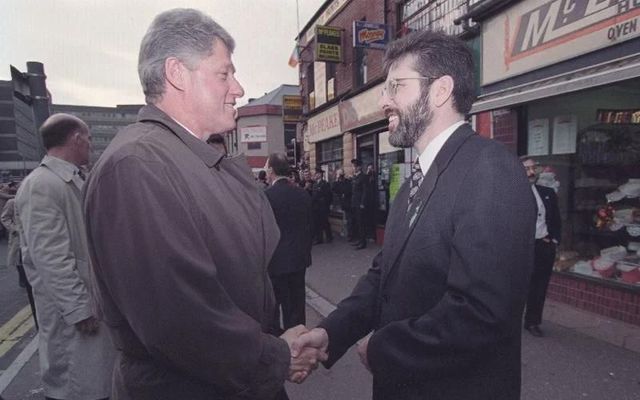Niall O’Dowd, the founder of IrishCentral, spoke with Jonathan Freedland's "Politics Weekly America" podcast ahead of the Good Friday Agreement's 25th anniversary about he helped connect US President Bill Clinton and Sinn Féin President Gerry Adams in the 1990s.
In the podcast, O’Dowd, who moved from Ireland to the US in the 1970s, details how he went from a fledgling newspaperman in California to an intermediary between Sinn Féin and the White House in the 90s, all while developing a sharp understanding of Irish America and its potential.
“In the context of the Irish American community, a major bloc of voters would be very much in favor of a candidate who favored action in Ireland," O'Dowd said of the political climate in the early 1990s.
“But it would be hard to discover a candidate because of the alliance between the United States and Britain, which has gone over 200 years, obviously.
“The American government were very reluctant to get involved in anything to do with Northern Ireland and my thinking was that there was no votes in that position.
"Irish Americans were a sleeping giant, [so I thought] let’s try and identify some people who would maybe take a different look at this and look at it from a point of view of a good vehicle for an election.
“But what was fascinating about Clinton was that he was a complete outsider. He was from Arkansas, he had no Irish heritage worth talking about."
O'Dowd, who helped organize Irish Americans for Clinton, recalls being "astonished" by Clinton's knowledge of figures like John Hume and Bernadette Devlin and was very up-to-date on issues in Northern Ireland.
O'Dowd recalled: “When I had a meeting with him at last, which happened in February 1992, he [Clinton] said to me, ‘I really want to do something on Ireland.’
“Which, you’re talking about 200 years, no American President had ever lifted a finger, not even JFK, in a really significant way on Ireland.
"But here was a candidate who was running, who was announcing quite seriously to me that he was interested and was going to work on the Northern Irish issue.
“That made a great headline for me,” O’Dowd admitted. “From that moment on, Bill Clinton and the Irish could do no wrong together.”
O'Dowd continued: “When Clinton took office he had made a number of promises and, like all good politicians, he broke every one of them initially.
“What had happened in the meantime was, I thought about ‘what was it that could be done in Northern Ireland if Bill Clinton became a major player?”
“And one of the most interesting trips I made was to Northern Ireland and met Gerry Adams and met leaders of Sinn Féin. I found them very open. I was astonished about how welcoming they were. Of course, the fact was the British had effectively sealed them off.
“But in fact, there was a groundswell of opinion within the Republican movement following the death of Bobby Sands on hunger strike that now was a time to build a political plan for the future and that the days of armed conflict would hopefully be over in the context of going down a political path.
“I put a proposal to them. The proposal was that I would put together a group of Irish Americans like no other had ever been. I would come to Ireland with them and we would meet them and we would meet all the leaders in Northern Ireland, and we would then report back to the White House and tell them that there was hope and definite opportunity for Clinton to intervene.”
A major intervention from Clinton ended up being the 48-hour visa he granted Gerry Adams in 1994. O'Dowd believes the visa led to the 1994 IRA ceasefire, which led to the Good Friday Agreement.
“Basically, the visa was the ultimate prize because it ended the isolation," O'Dowd says.
O'Dowd now describes the visa battle as "very, very tiring" and "the toughest time" of his life.
It was a “huge risk” for Clinton, O’Dowd remarked. The CIA, the FBI, the State Department, and the Speaker of the House were against him, and the British government was “incandescent with rage” when the visa was offered.
Adams visited the US on a 48-hour visa in January 1994. “And to his eternal credit, how many more may not have lived if Bill Clinton had not offered a visa to Gerry Adams?”
On August 31, 1994, the IRA announced a cease-fire.
“I just broke down,” O’Dowd recalled about hearing the news report in Dublin announcing the cessation. “I spent so much time and energy on it.”
Less than four years later, politicians were gathered in Belfast attempting to get what would become known as the Good Friday Agreement over the line.
"I remember at 4:45 am that morning, the phone ringing and a voice telling me that 'it's done.'"
Reflecting, O'Dowd says: "The major thing I'll remember is the fact that an American President moved the entire Northern Ireland issue forward to such an extent that he changed the complete dynamics of it, and that's how much we owe Bill Clinton."




Comments